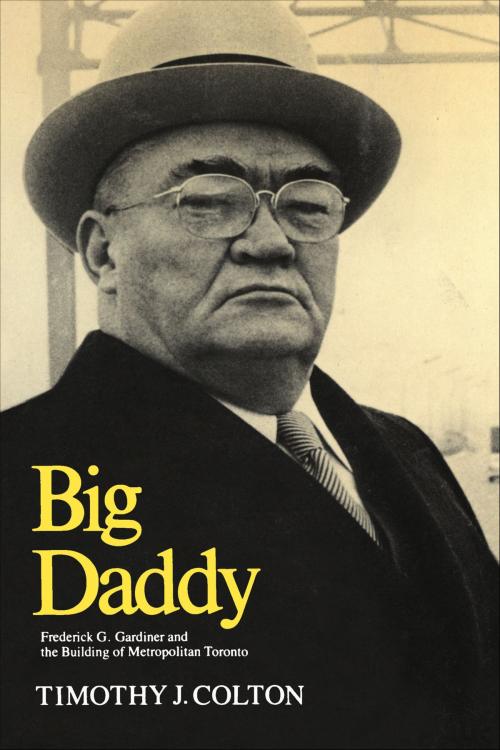Big Daddy
Frederick G. Gardiner and the Building of Metropolitan Toronto
Nonfiction, Social & Cultural Studies, Social Science, Sociology, Urban, Political Science, International, Biography & Memoir, Political| Author: | Timothy Colton | ISBN: | 9781442654945 |
| Publisher: | University of Toronto Press, Scholarly Publishing Division | Publication: | December 15, 1980 |
| Imprint: | Language: | English |
| Author: | Timothy Colton |
| ISBN: | 9781442654945 |
| Publisher: | University of Toronto Press, Scholarly Publishing Division |
| Publication: | December 15, 1980 |
| Imprint: | |
| Language: | English |
Frederick Gardiner's public life was rich and long, from his initiation into politics as a Toronto schoolboy before the First World War, through his involvement with the Ontario Conservative party and suburban politics in the 1930s and 1940s, on through his years as first chairman of Metropolitan Toronto (1953-61), to the relinquishing of his last public office in 1979.
This is a readable and perceptive biography of the exuberant and powerful politician who captured the public imagination of Toronto and created a legend around himself during his lifetime.
The book focuses mainly on Gardiner's experience as founding boss of Metropolitan Toronto. This first metropolitan government in North America was in many ways his personal machine. Gardiner made an indispensable contribution to its effectiveness and to its very survival. He presided over an unprecedented boom in urban development and construction. His public works projects included the first urban expressway in Canada (the Gardiner Expressway).
Gardiner's political nickname, 'Big Daddy,' fits him well. He revelled in his reputation as a political bulldozer, and was often described as the Canadian equivalent of Robert Moses, the famous and feared coordinator of construction for New York City. Gardiner was a man for the times, an unusual person whose character seemed to match the requirements of a city bursting at its seams. His lack of interest in public participation generated great controversy and left a lasting impression on Toronto's metropolitan government.
Readers concerned with politics and urban government will learn much from Gardiner's experiences and conduct as he wrestled with his political surroundings and with urban policy problems such as planning, housing, and transportation. And this portrait of a dynamic and aggressive man who symbolized the Toronto on a generation ago will appeal to those who remember these years.
Electronic Format Disclaimer: Photo section removed after page 150 at the request of the rights holder.
Frederick Gardiner's public life was rich and long, from his initiation into politics as a Toronto schoolboy before the First World War, through his involvement with the Ontario Conservative party and suburban politics in the 1930s and 1940s, on through his years as first chairman of Metropolitan Toronto (1953-61), to the relinquishing of his last public office in 1979.
This is a readable and perceptive biography of the exuberant and powerful politician who captured the public imagination of Toronto and created a legend around himself during his lifetime.
The book focuses mainly on Gardiner's experience as founding boss of Metropolitan Toronto. This first metropolitan government in North America was in many ways his personal machine. Gardiner made an indispensable contribution to its effectiveness and to its very survival. He presided over an unprecedented boom in urban development and construction. His public works projects included the first urban expressway in Canada (the Gardiner Expressway).
Gardiner's political nickname, 'Big Daddy,' fits him well. He revelled in his reputation as a political bulldozer, and was often described as the Canadian equivalent of Robert Moses, the famous and feared coordinator of construction for New York City. Gardiner was a man for the times, an unusual person whose character seemed to match the requirements of a city bursting at its seams. His lack of interest in public participation generated great controversy and left a lasting impression on Toronto's metropolitan government.
Readers concerned with politics and urban government will learn much from Gardiner's experiences and conduct as he wrestled with his political surroundings and with urban policy problems such as planning, housing, and transportation. And this portrait of a dynamic and aggressive man who symbolized the Toronto on a generation ago will appeal to those who remember these years.
Electronic Format Disclaimer: Photo section removed after page 150 at the request of the rights holder.















